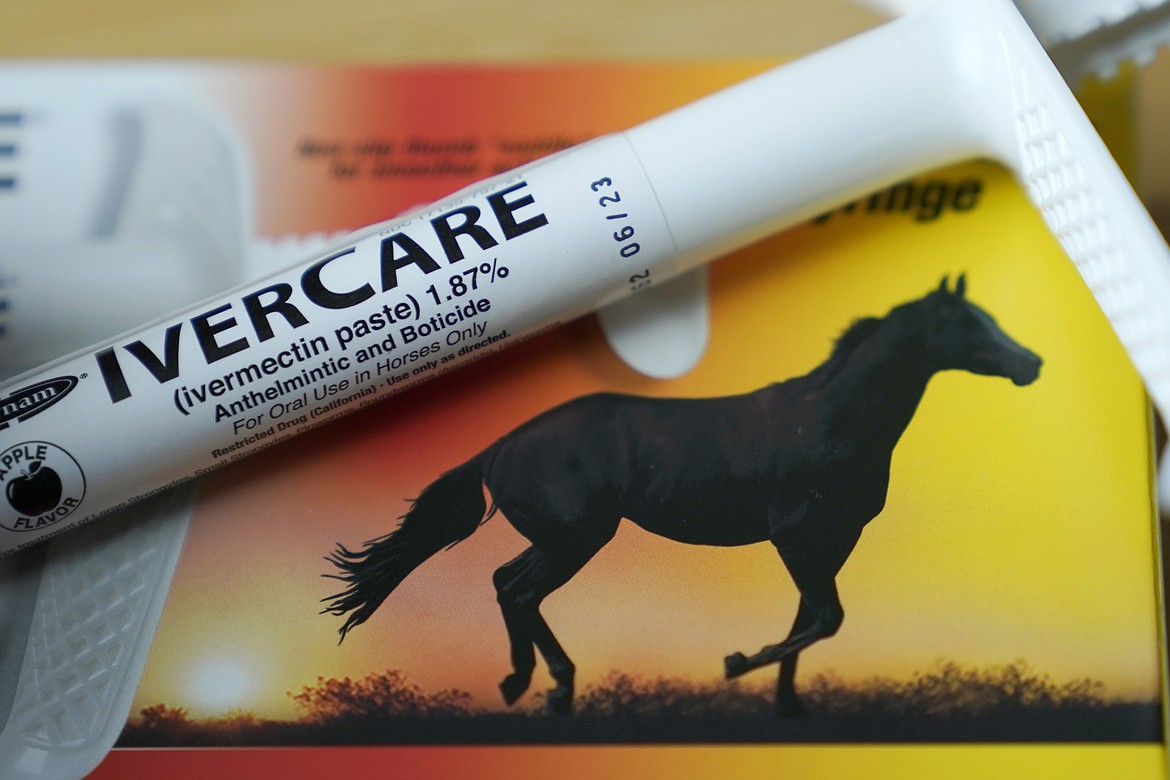Doctors urge vaccination, not livestock dewormer, in fight against Covid
At least a few people in the Flathead Valley have become ill after taking a widely available antiparasitic drug meant for animals in hopes of treating or preventing Covid-19, according to local hospital officials.
Ivermectin has been used since the 1970s to kill parasites in humans, including head lice, scabies and a worm that causes a condition known as river blindness. The drug is inexpensive and comes in a variety of forms, including tablets, injectables and topical ointments, and the World Health Organization has deemed it an essential medicine for treating several kinds of infections in people. It's also commonly used to purge heartworms from livestock such as horses, sheep and cattle.
A recent wave of misinformation fueled by some media figures and politicians, as well as a small contingent of doctors, has prompted thousands of Americans to try self-medicating with ivermectin to fight Covid, despite warnings from public health experts and ivermectin manufacturers that the drug doesn't work against the coronavirus.
Many have pressed their physicians and pharmacists for ivermectin prescriptions, ordered ivermectin products of dubious origin via the internet, and even sought out foul-tasting, veterinary-grade ivermectin pastes from their local ranch supply stores. Some have overdosed after taking quantities of the drug intended for large animals, or trying to figure out appropriate doses based on veterinary guidelines.
The Centers for Disease Control and Prevention last month reported a fivefold increase in ivermectin-related calls to poison control centers across the U.S., as well as a 24-fold increase in weekly ivermectin prescriptions, from pre-pandemic baselines. And the Food and Drug Administration recently cautioned on Twitter against using veterinary ivermectin products: "You are not a horse. You are not a cow. Seriously, y'all. Stop it."
In the Flathead, at least a few people have shown up at the hospital with symptoms of ivermectin toxicity, which can include severe nausea, abdominal pain, vomiting and diarrhea, as well as neurological issues such as headaches, confusion, seizures and visual hallucinations.
"We have had some suspect cases of ivermectin toxicity using veterinary products, that were pretty strongly suspected," said Dr. Jeffrey Tjaden, an infectious disease physician at Logan Health. He and a Logan Health spokesman didn't immediately have a precise tally of those patients.
"It's not a large number, but we are seeing it used," Tjaden said. "And I've heard reports from the local veterinary products (sellers) that people are buying it and asking for dosing adjustments and things. So I know it's being used."
TJADEN, LIKE the vast majority of physicians and public health experts, said vaccination remains the best way people can protect themselves from the coronavirus, adding that other measures like social distancing, masking and frequent handwashing can further reduce transmission.
The three Covid vaccines available in the U.S. — Pfizer-BioNTech, Moderna and Johnson & Johnson — each have undergone rigorous safety and efficacy trials in order to receive emergency-use authorization from the FDA. The Pfizer vaccine last month received full FDA approval, meaning it meets the agency's gold standard, for people ages 16 and older.
Meanwhile, data supporting ivermectin as a treatment for Covid is scant.
Early in the pandemic, researchers around the world began testing a barrage of existing medicines to see if anything could quell the symptoms of Covid and keep patients off ventilators. Among those were ivermectin and the antimalarial drug hydroxychloroquine, which former President Donald Trump and others heavily promoted.
While hydroxychloroquine briefly had emergency-use authorization for Covid treatment last year, the FDA revoked that authorization due to a lack of evidence showing it was effective, as well as side effects including heart arrhythmia. The National Institutes of Health now recommends against its use for hospitalized and non-hospitalized Covid patients.
In one study in spring 2020, Australian researchers demonstrated that ivermectin could kill the coronavirus when introduced at extremely high concentrations in petri dishes. But replicating that dosage in human bodies would probably prove fatal.
"The challenge is the amount of medication that they used to destroy the virus was at a dose much, much higher than we could ever achieve in humans," Tjaden said.
CLINICAL TRIALS also have shown little promise for ivermectin as a Covid treatment.
Regardless, a group called America's Frontline Doctors, which originated as a rightwing political organization, has peddled the drug via telemedicine appointments and online pharmacies, racking up hundreds of accusations that it has bilked customers by failing to provide paid-for services, according to detailed reports from Time magazine and other outlets.
The pharmaceutical company Merck, which manufactures the drug, says it has found "no scientific basis for a potential therapeutic effect against Covid-19 from preclinical studies," as well as "no meaningful evidence for clinical activity or clinical efficacy in patients with Covid-19 disease" and "a concerning lack of safety data in the majority of studies."
Tjaden's advice: "No human use of veterinary products." Talk to a doctor about getting vaccinated, he said, and "be very cautious and wary of any online pharmaceuticals unless they can be verified, because they can be counterfeit medicines or not verified medicines."
According to local and state health officials, Flathead County currently has more than 1,000 active cases of Covid, the second-highest number in Montana, behind only Yellowstone County with more than 1,600. The virus has killed 127 people in Flathead County since the start of the pandemic. About 42% of eligible county residents are fully vaccinated.
Assistant editor Chad Sokol may be reached at 406-758-4439 or csokol@dailyinterlake.com.


